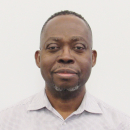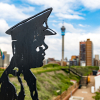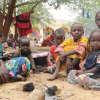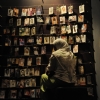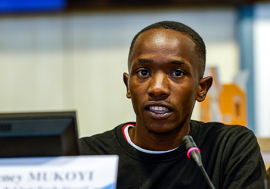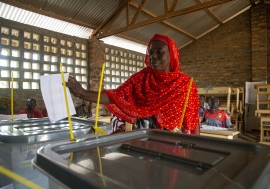African presidential elections 2015: Nigeria leads the way
African presidential elections 2015: Nigeria leads the way
Reports of revellers dancing on the streets of several cities across Nigeria to celebrate the victory of their candidate over the incumbent president, was welcome news for many observers of the country’s political history. The stakes in the just concluded elections were so high that many had feared the worst for Nigeria and beyond should the loser refuse to concede defeat.
Considering that in Nigeria – Africa’s most populous nation – elections have always been marred by violence fuelled by allegations of vote rigging and fraud and that at one time in 1993 the presidential contest was even annulled as the projected outcome was reportedly unfavourable to the then military junta, fears of uncertain days for Nigeria were not far-fetched.
Analysts and observers breathed a sigh of relief as the incumbent Goodluck Jonathan quickly conceded and congratulated his opponent, Muhammadu Buhari.
The worst fears have passed and many hailed the development as “historic” for the country and the African continent in general. It was “one of the most significant political events on the continent since the 1994 election of Nelson Mandela in South Africa brought an end to the white majority,” the UK-based Financial Times reckoned as final votes were tallied on 31 March.
The polls could have been particularly destabilising because “… the acrimony between the parties, aggravated by regional and religious claims of entitlement to the presidency, had created a volatile environment,” Comfort Ero, the International Crisis Group (ICG)’s Nairobi-based Africa programme director warned months ahead of the polls.
A fallout after a disputed election win would have affected not only the country but the whole West African region, where Nigeria remains an economic powerhouse. Alone, the country accounts for more than three quarters of the entire Economic Community of West African States (ECOWAS) region’s economy.
Writing for the Conversation, an Australian academic online journal, Richard Joseph, a Professor of International History and Politics at Northwestern University, echoed this view, saying he believed that the significance of the polls went beyond Nigeria and the African continent.
Against the backdrop of a terror campaign and insurgency waged by Boko Haram Islamist militants in most of northern Nigeria and the spillover effects on Cameroon, Chad and Niger, the victory of the challenger, a Muslim from the North, against an incumbent from the South, is “significant because it has been achieved via democratic elections”, Prof. Joseph noted, adding that: “In no other large country, with an almost equal number of Muslims and Christians, is such a process conceivable.”
Seven more elections in Africa in 2015
Following Zambia, where by-elections were held in January to find a successor to the deceased Michael Sata, Nigeria was the second of nine countries on the continent scheduled to hold presidential elections in 2015. The other countries are Burkina Faso, Burundi, Central Africa Republic, the Comoros, Côte d’Ivoire, Sudan and Togo.
The holding of regular elections in most countries in the continent is a testimony to the progress made over the last decade in achieving relatively peaceful and constitutional political transitions. Not long ago, credible elections were scarce across the continent. They were not even held in many places and in the few countries where they were held, incumbents ran almost unopposed or were guaranteed to win with about 90 % of the votes. Since the early 1990s, things have changed substantially, in part because of demands by African civil societies for greater freedom and accountability.
Yet, the current political and security background against which ballots are going to be cast in most of these countries remain worrisome.
In Côte d’Ivoire, resentment over the crushing of the post-election crisis in 2011 still lingers and questions over citizenship linked to voter registration – one of the contentious issues of the 2011– are still not resolved.
Recent events in Burkina Faso, which borders both Côte d’Ivoire and Togo, where the incumbent was toppled after trying to have the Constitution changed so he could prolong his mandate, and a heated political debate in Togo to restore constitutional limits to the incumbents’ mandate, are adding to a potentially volatile environment in the West African sub-region. The prospect of contested elections in the three countries and other disruptions are further adding to concerns in an already troubled region.
Peace remains elusive in northern Mali too, while Guinea, Liberia and Sierra Leone are battling the Ebola crisis.
Meanwhile, away from West Africa, political tensions are growing in the small landlocked country of Burundi over the incumbent’s alleged intentions to extend his constitutional term.
However, having pulled it off, Nigeria no longer presents a risk, at least not linked to the just concluded elections.
“I promised the country free and fair elections. I have kept my word,” the outgoing Nigerian President Goodluck Jonathan reminded his countrymen after conceding defeat on 3 March, “I have also expanded the space for Nigerians to participate in the democratic process. That is one legacy I will like to see endure,” he added
The Nigeria Independent National Electoral Commission (INEC) had also sworn to help organize free and fair elections. They have delivered. Although unsung, the steadfastness of the electoral body was central to ensuring that the voice of Nigerians, as expressed at the polls, was heard. Reportedly, INEC chairman Attahiru Jega, after being forced to postpone the elections for six weeks, was under heavy and repeated pressure from politicians to resign. Yet he resisted and was able to organize elections that were overall acknowledged as free and fair.
Beyond the global and symbolic resonance, the real lessons from the Nigerian experience are probably the simplest: peace and stability are dividends of the rule of law.
Whether one agrees with his politics and past choices, the outgoing President Jonathan has shown statesmanship after losing the elections.
There has always been “a very positive response by the public in terms of determination to register and vote”, Wole Soyinka, the Nigerian Nobel Laureate told the UK-based Guardian about the electorate, a day after the vote. While the enthusiasm of voters has always existed across the continent, it has not always been properly acknowledged and respected by political leaders.
Since, for most African leaders, the challenge has always been to guarantee an electoral process that is truly reflective of the peoples’ choice, Nigeria has just demonstrated that meeting those challenges is not so hard after all. Responsible political leadership is all that’s needed.


